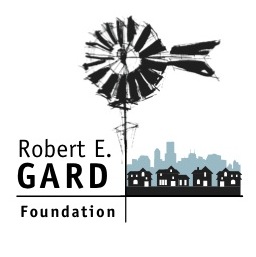 Last week I provided daily summaries of The Robert E. Gard Foundation’s Our Communities: A Symposium on the Arts at The Johnson Foundation at Wingspread’s conference center.
Last week I provided daily summaries of The Robert E. Gard Foundation’s Our Communities: A Symposium on the Arts at The Johnson Foundation at Wingspread’s conference center.
To be honest I have not had the courage to go back an re-read them as I am well aware of the fact that my listing of topics and key points was without synthesis and with very little context.
With the advantage of a few days distance (and rest) it’s probably worthwhile to lay out a little more of the “sense” of the gathering. To me, there were three principal themes that emerged over the course of the three days: Equity, Structure, and Relationships. What follows is a very brief overview of each along with some pertinent and sometimes highly memorable quotes. The quotes are attributed as best I can remember, although I’m pretty sure in a couple of cases I have mis-remembered the person who said them. Please accept my apologies.
Equity
As might be expected, issues of equity raised the most heat. We by no means dealt with this adequately, but it is one of the first times, in a public forum in the arts, I’ve heard “white supremacy,” “white privilege,” and “oppression” brought forward as essential issues on multiple occasions.
Carlton Turner: “Are your policies contributing to consolidation or distribution of power?”
Roberto Bedoya:
- “Is creative placemaking a property rights movement or a human rights movement?”
- Paraphrase: Beware the white savior industrial complex
William Cleveland: “Story is power. The suppression of stories is oppression.”
Rosy Simas: “We” cannot equal “me and my friends.”
Structure
Through what vehicles do we do our work in the arts? At this point it’s nearly a truism that the 501(c)(3) model does not fit all situations, Indeed, it’s position as the default way of organizing in the arts is beginning to be seen as highly flawed. More flexible, more arts-appropriate, and more human/humane forms of organizing our work are essential.
Carlton Turner: Artists have been left out of the system.
Rosy Simas: Think of artists as plankton, the critical root of the food chain.
Robert Lynch: “The arts industry is ruled by fear of losing a buck.” This is different from 40 years ago when almost no one had a buck. (The second sentence is a paraphrase.)
Doug Borwick: “Has the habit of staff overwork in arts organizations gotten in the way of building relationships with communities? Or has reluctance to build relationships encouraged managerial overwork?”
Relationships
Hands down, the most consistently raised topic was relationships–the need for our work to be based on/built upon them. The attendees, almost to an individual, recognized that the core of working with communities is relationship building. This is hardly surprising, but the pervasiveness of the awareness was telling.
Roger Dower: “How might [programs/outcomes] be different if an anti-poverty program was at your table?”
David O’Fallon:
- “We must see communities as resources.”
- “First the relationship, then the program.”
The panel made up of Savannah Barrett, Tatiana Hernandez, and Laura Zabel was chock full of good quotes, but I can’t remember who gets credit for which:
- “Expand the development of circles of relationships to open up organizations.”
- Paraphrase: Utilize joy as a connector and facilitator
- Paraphrase: Develop a strategy of belonging
- Paraphrase: Awe and wonder are the gateway to transformation (though not transformation itself).
Michael Rohd: “Sitting in the dark with a group of strangers is not, by itself, transformative.”
And, of course Robert E. Gard’s words were everywhere in almost every presentation. But two with which I was not previously familiar continue to stand out to me almost a week after we left the conference center:
- “The springs of the American spirit are at the grass roots.”
- Paraphrase: We need to move from a focus on “professionalism” to a focus on joy and meaning.
The Robert E. Gard Foundation is grateful to so many for their support for the Symposium. We are also deeply indebted to all the participants who gave so much of themselves in presenting, listening, and contributing to the conversations. The Foundation will be spending the next few months attempting to make what happened in those few days available in as many ways and in as much detail as possible.
Engage!
Doug

Hi Doug, thanks for this documentation! Just wanted to credit Tatiana Hernandez with the plankton metaphor.
Thanks for the correction!
some related notes:
• We’re fighting and fighting for resources, but are we fighting as hard for connection and relevance? (from Bill, Maria, Michael, Roberto and Rosy’s provocations)
• As a community we haven’t built an analysis of systemic racism. Systems are in service to where you want to go. (from Bill, Maria, Michael, Roberto and Rosy’s provocations)
• Economy of awe – giving people the opportunity to be changed by art and then finding value beyond economic (from Savannah, Tatiana and Laura’s remarks)
• What if we run organizations based on the value of relationships = the relationship economy (from Savannah, Tatiana and Laura’s remarks)
• How do we find our kinship with each other? Is that our fundamental work? How do we find how we really are connected? The fundamental evaluation is the strength of our relationships. The human community. What if that was the nature of our work? (from David O’Fallon’s remarks)